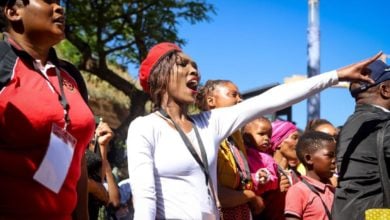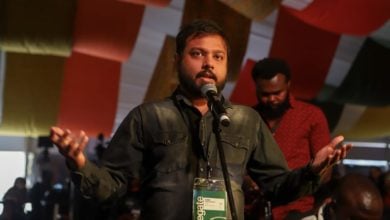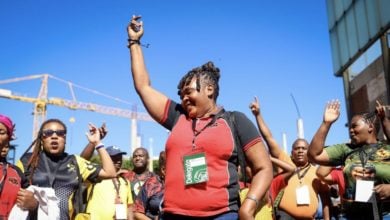In yet another California election dominated by tech, developer, banking and other corporate money, the capitalists won again. And thanks to the corrupt and anti-democratic “top-two” system, the only candidates on the statewide ballot in November’s “general election” will be Democrats and Republicans: no third party candidates allowed and not even write-in votes will be counted.
Democrat Gavin Newsom and Republican John Cox will be on November ballot for Governor, while two Democrats, Dianne Feinstein and Kevin de Leon will be the U.S. Senate candidates. The Democrats are heavily favored to once again sweep the statewide offices. Democratic domination of California politics has done absolutely nothing to stem soaring rents and homelessness.
While ballots are still being counted, it is now clear that more than 300,000 people voted for the candidates of the socialist Peace and Freedom Party (PFP), a multi-tendency party which has ballot status in California.
As of June 15, gubernatorial candidate Gloria La Riva has received over 17,000 votes, more than any other third-party candidate for that office, and is 12th among 27 candidates. Insurance Commissioner candidate Nathalie Hrizi has received more than 295,000, 5 percent of the votes in a four-person race and the highest vote for any PFP candidate. Hrizi received more than 14 percent of the vote in San Francisco, her hometown. Both La Riva and Hrizi are leading members of the Party for Socialism and Liberation.
In order to maintain its ballot status, Peace and Freedom needed to receive two percent of the vote in at least one of the statewide elections.
In addition to Hrizi, Controller candidate Mary Lou Finley and Treasurer candidate Kevin Akin, both surpassed the 2 percent requirement, with Finley receiving 3.9 percent (242,000) and Akin 2.2 percent, (132,000). In San Francisco, Akin received nearly 10% of the vote, more than either of the Republican candidates. PFP U.S. Senate candidate John Parker received over 20,000 votes, finishing 23rd in a field of 32.
PFP Secretary of State candidate C.T Weber has received more than 57,000; votes. Jordan Mills has 212 votes in U.S. Congressional District 49 among 12 candidates in an election where both the national Democratic and Republican parties spent millions.
The Vote Socialist campaign distributed tens of thousands of palm cards as well as many lawn signs, statements and T-shirts. We raised thousands of dollars and collected hundreds of petition signatures, just to be on the ballot. We built two websites and a strong social media presence, particularly on Facebook, with numerous posts, videos and photos reaching hundreds of thousands of people with the message that only the socialist reorganization of society can solve the multiple crises that capitalism has created.
The PFP candidates campaigned across the state, from Arcata in the far north, to San Diego in the south, in the Central Valley and Silicon Valley, and more. They represented, as Gloria La Riva emphasized: “The millions of disenfranchised – the undocumented, permanent residents, prisoners and former prisoners — as well as those eligible to vote.”
Gloria La Riva’s radio interview with Dr Drew and Laura Sivan
How the “Top-Two” system further diminishes an already-undemocratic system
Even before the passage of Proposition 14 in 2010 which created the “top-two” system, the election process was a form of “dollar democracy.” Candidates with the most dollars – raised overwhelmingly from Corporate America and the super-rich – generally prevail.
Proposition 14 made it worse – much worse. It barely passed after a heavily funded campaign of lies and deception so typical of capitalist politics in California and across the country.
Under the old system, each of the six ballot-qualified parties elected their candidates in the June primary election, who then went to the November general election. The requirements for “third party” candidates to be placed on their respective party’s primary ballot were relatively simple and didn’t include huge filing fees.
Of course, “dollar democracy” prevailed then, as well, with the millions flowing into the accounts of the Democrat and Republicans.
Proposition 14 threw all the candidates into one big primary, with filing fees ranging from $3-4,000 or many thousands of signatures, just to appear on the June ballot for statewide office.
The wealthy authors of Prop. 14, sold it to the voters on the false theme that it would be more “democratic,” in that all voters would be able to participate in primary voting, even if they weren’t registered in a party.
What they didn’t include in their massive, deceptive ad campaign was that it would make the general election far less democratic, being restricted to just two choices. Under the current law, there is no means whatsoever for a third candidate to be placed on the ballot or even to have write-in votes counted.
It reality, “top-two” converts the primary election into the general election, and reduces the November election, formerly the main one, into a mere run-off.
Discontent with “top-two” is growing. At the same time, it takes many millions of dollars to place a new proposition on the ballot and carry out an effective campaign. It remains to be seen whether such a campaign will unfold.
Socialist know that the electoral arena will not be decisive in bringing about a new system. Ultimately, it is the struggle in the streets, workplaces, neighborhoods and campuses that really effects change and a revolution that is desperately needed.
But despite all the anti-democratic obstacles the system has created, the elections still offer a unique (even if diminishing) opportunity to reach millions of people with the message of socialism.
Building the movement and spreading the ideas of socialism requires funds. Donate HERE. Become a sustainer today!





